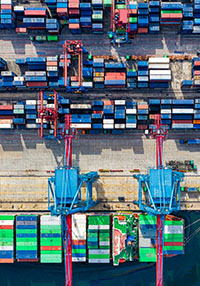මැඞ්රිඞ් ප්රොටෝකෝලය යනු වෙළද ලකුණු විදේශයන්හි ලියාපදිංචිය සදහා ඇති සරල, ගෝලීය ක්රමවේදයකි. ශී්ර ලාංකික ව්යාපාරවලට වෙළද ලකුණු විදේශ රටවල ලියාපදිංචියේ දී මුහුණදීමට සිදුවන දුෂ්කරතාවයන් එමගින් සමනය කරගත හැක.මැඞ්රිඞ් ප්රොටෝකෝලයෙන් ප්රතිලාභ ලබාගැනීමේ දී, වෙළද ලකුණු ශී්ර ලංකාව තුළ ලියාපදිංචි කිරීම තීරණාත්මක පළමු පියවරකි.
The Madrid Protocol is a simplified global system for registering trademarks abroad. It eases trademark registration abroad for Sri Lankan businesses. Sri Lanka is looking to complete accession to the Madrid Protocol by the end of 2017 or early 2018. However, accession to the Madrid Protocol will not necessarily help address the related challenges faced by Sri Lankan business; the challenge of registering trademarks in Sri Lanka. Verité has conducted research on the challenges faced in the process of registering trademarks in Sri Lanka and how these challenges undermine the benefits of the proposed accession to the Madrid Protocol. This policy brief presents an analysis of these issues and provides recommendations to overcome the identified obstacles.
Sri Lanka’s exports are heavily concentrated on a few markets and a few products. The government’s recognition of export diversification as an important policy strategy to revive exports, indicates that both market and product concentration are seen as critical bottlenecks in this regard. This report compares and contrasts Sri Lanka’s export product and market concentration and its export composition against that of the world and selected Asian economies. The objective of this brief analysis is to understand where Sri Lanka stands in the world and in comparison to its neighbours that have performed well in terms of export concentration and composition.
There are several causes to the problems facing Sri Lanka’s economy. The problem of bureaucratic inefficiency exemplified by this case study: finding information about trade regulations is a significant barrier to improving the economy in agricultural products. The poor performance in the supply of even basic information indicates the larger challenge of improving the bureaucracy.
Improving export performance is a national priority for Sri Lanka. However, the room for exporters to improve their export competitiveness is significantly constrained by the time it takes to process export documentation at various Sri Lankan border agencies. As such, Sri Lanka can significantly improve the competitiveness of its exporters by reducing processing times at the border. A proven method in this regard is the use of Electronic Document (e-document) processing platforms for trade. Currently in Sri Lanka, the benefit of this particular opportunity is being hobbled by the non-acceptance of electronic signatures (e-signatures) despite most of the prerequisites and systems being in place. This policy note sets out the main findings of a study conducted by Verité Research on the non-acceptance of e-signatures in Sri Lanka.
In the recent past, Sri Lanka has focused on negotiating Free Trade Agreements (FTAs) as a means to revive its export sector. FTAs address external barriers that Sri Lankan exporters face in the importing country. However, trade barriers are found not only at the border of the importing country, but also at the border of the exporting country. Using agriculture products as case studies, this study identifies such domestic barriers. Findings reveal that domestic barriers to trade significantly undermine the export capacity and competitiveness of Sri Lankan exports. Hence, addressing them is important to unleash the country’s export potential.
The Madrid Protocol is a simplified global system for registering trademarks abroad. It eases trademark registration abroad for Sri Lankan businesses. Sri Lanka is looking to complete accession to the Madrid Protocol by the end of 2017 or early 2018. However, accession to the Madrid Protocol will not necessarily help address the related challenges faced by Sri Lankan business; the challenge of registering trademarks in Sri Lanka. Verité has conducted research on the challenges faced in the process of registering trademarks in Sri Lanka and how these challenges undermine the benefits of the proposed accession to the Madrid Protocol. This policy brief presents an analysis of these issues and provides recommendations to overcome the identified obstacles.
Public procurement is a key instrument through which governments deliver important social and economic goods to citizens. Efficient and accountable public procurement enables better utilisation of public funds, and in better public goods and services. Strengthening public procurement in Sri Lanka requires enhancing its efficiency, cost-effectiveness and competitiveness. E-procurement offers the government major efficiency gains, cost-savings, higher value for money and better fiscal management.
Public procurement is a key instrument through which governments deliver important social and economic goods to citizens. Efficient and accountable public procurement enables better utilisation of public funds, and in better public goods and services. Strengthening public procurement in Sri Lanka requires enhancing its efficiency, cost-effectiveness and competitiveness. E-procurement offers the government major efficiency gains, cost-savings, higher value for money and better fiscal management.




